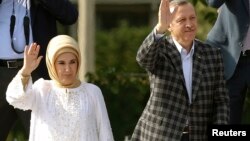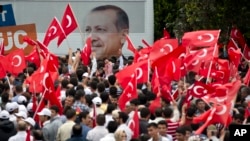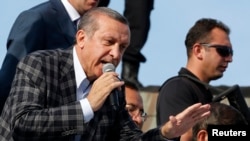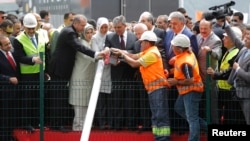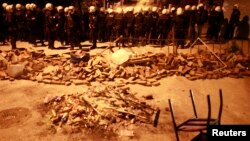ISTANBUL —
Prime Minister Tayyip Erdogan stands before a sea of cheering faithful waving Turkish flags and, to shouts of "Allahu Akbar," God is Greatest, summons the spirit of pious Ottoman poets in denouncing protesters who challenge his power.
Across Istanbul, the same flags, white crescent moon and star on a red background, are raised, but they proclaim what some Erdogan critics see as a different kind of Turkey.
Riots and protests have highlighted an underlying schism in Turkish society reaching back to the 1920s when Mustafa Kemal Ataturk forged a secular republic from the ruins of an Ottoman theocracy.
He banished Islam from public life, replaced Arabic with Latin script and promoted Western dress and women's rights.
What emerged was a sometimes uneasy cohabitation of what some have called "White Turks," a secular Western-facing elite, and "Black Turks" - a more conservative, religious population largely excluded from the privileges of state power and viewed warily by generals long considered guardians of secularism.
"I was surprised to see those crowds carrying the Turkish national flag," said Ugur Genc, 42, standing on the Istanbul square that has become the Centrex of protests. "We too carry the same national flag, but we're not the same."
At a nearby barricade stands a woman in a red cap emblazoned with the words "This Is My Republic" and a tee-shirt bearing the face of Ataturk. She sees Turkey's secular constitution under threat from the more religious followers rallying to Erdogan.
The Turkish flag, has become the rallying point of both sides claiming the republic for their cause.
Erdogan dismissed any suggestion the forces ranged against him, especially those who have fought street battles with police over the last week, represented the true Turkey.
"Aren't those who gathered at Istanbul airport in two hours, in Adana, Mersin, and here in Ankara - the people?" he asked during one of six meetings he addressed on Sunday.
The objections of Erdogan were shared by his supporters.
"I love my country," a woman giving her name as Zeynep says. "We will not let some looters hijack our country and our flag."
Erdogan's rallies also carried a nod to Ataturk, with some portraits and banners showing his face.
Erdogan, who might have fallen into the category of "Black Turk," made history in 2002 when he led to power a new party amalgamating Islamists, liberals and nationalists. Impatient with fractious traditional secularist parties, voters welcomed his plans for social reform and renunciation of political Islam.
Only three years earlier, he had fallen foul of his love of words, jailed for reciting a poem by a Turkish nationalist deemed an incitement to religious hatred. "The mosques are our barracks, the domes our helmets, the minarets our bayonets."
Protesters on Taksim Square and in other cities across Turkey believe that three election victories later, Erdogan's blustery, florid style so beloved of voters has turned to intolerance with any challenge inside or outside his AKP party.
Erdogan denies any intention to subvert the secular republic and impose an islamist order.
Turning Eastwards
"I cannot applaud cruelty, I cannot love what is cruel," Erdogan told a rally, quoting Mehmet Akif, an Ottoman poet who wrote the Turkish national anthem, but who abandoned Ataturk's Turkey, unhappy with its secular constitution. "I am the enemy of the wrong do-er but I love the wronged."
The protests draw an unlikely coalition; Kemalists alongside Kurdish activists, liberals and leftists, unionists and gay rights activists, the bones perhaps of a new civil society. In ways Erdogan himself may not have anticipated and clearly does not approve he has lifted the expectations of rising generations critical of what they see as state interference in their lives.
Cafes are banned from serving wine at pavement tables, new restrictions on alcohol sales have been introduced; similar to those in Western countries, but critics see in this Erdogan's pious objection to alcohol rather than health concerns.
Some see Turkey's face changing in other ways. The head scarf, symbol of female piety once banned from state offices, is now seen in colleges and even the presidential palace. Erdogan's wife stands alongside him, head covered. His public reflections on women's role suggest a more traditionalist view.
But many Erdogan supporters see these changes as liberation.
When Erdogan quotes poet Akif on his love for those "wronged," he speaks among other things of women who have in the past been denied higher education because of a scarf ban. The ``wrong-do-er'', his enemy, is by implication a pre-Erdogan order that denied traditional Turkish values.
For many middle class Turks raised in a strictly secular republic Erdogan's words and his message smack of a foreign land, a Turkey facing the Middle East rather than Europe.
"I salute my brothers in Sarajevo, Baku, Beirut, Damascus, Gaza, Mecca, Medina," Erdogan says. No mention of Berlin, Paris or London to the cheering masses. But Erdogan can contest his opening to the Arab world brings commerce and influence alike.
Many on Taksim and at protests across Turkey are young enough to have known only Erdogan as prime minister. He might argue youth blinds them to the scale of his reforms.
In his first terms he opened EU entry talks, extended minority rights, outlawed torture, and showed courage in seeking to end a Kurdish rebellion that has cost 40,000 lives. He won the blessing of liberals, secularist and the religious alike.
Arguably his greatest single achievement was in bringing to heel, in line with EU requirements, a military that had toppled four governments in four decades; though sceptics who will never trust Erdogan argue this was done not in the name of democracy but to remove a barrier to political Islam.
The economy has boomed, per capita income tripling.
Erdogan, raised in Istanbul's rough-edged Kasimpasa district, far from the world of big business, clearly now sees hypocrisy among influential businessmen abandoning him.
"If a bank general manager claims he sides with these vandals, he'll find us against him. Those who came and told us they had got five times richer in our time now change sides."
Picture gallery on Turkish protests
Changing places
Some on Taksim suggest what they are seeing is a settling of accounts for restrictions on religion in the past.
"The prime minister says we're provocateurs, but he's the real provocateur," said Ece Simsek, 17. "He's using religion to provoke people...He boils religion down to whether we're wearing a miniskirt or a headscarf, and that's wrong."
Islamist parties have been banned repeatedly, and in 1997 the first Islamist-led government was ousted by the army in a campaign of pressure since dubbed the "post-modern coup."
"I've been in politics forty years," Bulent Arinc, a victim of that "coup," said. "I'm someone who's felt kicked around, ignored; my wife, myself, my lifestyle, with my opinions. But we didn't consider fighting. We sought solutions within democracy."
Erdogan's critics argue that democracy is being rolled back.
Investigation of alleged coup plots against Erdogan sprawled, bringing the arrest of hundreds of top generals, intellectuals and journalists. In a display of well choreographed press, seven newspapers carried an identical headline last week commending Erdogan's handling of protests.
Some critics say the decisive sea-change in the AKP after the 2010 election gave Erdogan a record 51 percent vote.
Former AKP deputy Suat Kiniklioglu recalls a purge of centrist and liberal forces in the parliamentary group in 2011.
"Many who were critical in shaping the perception that the party was moving to the center in 2007 were expelled," he writes in Zaman daily. Executive organs were similarly purged in 2012.
This might resonate with those who see Erdogan using democracy as a path to the Islamic order poet Akif cherished.
While the drama and rhetoric of recent weeks may for some speak of "two Turkeys," 10 years of Erdogan has in fact blurred somewhat the disputed notion of White Turks and Black Turks.
"These terms are not significant today," said Cengiz Candar, a journalist who has followed Erdogan's career. "Erdogan's complexion has changed. His skin has become lighter."
Meant here is that Erdogan has succeeded in breaking the hold on the old elite on the state, from the military to the courts, and built his own power base with all its prerogatives of patronage. One result has been an economic boom in AKP's central Anatolian heartland. Wealth is being redistributed.
"Erdogan unleashed the potential of a rural-provincial populous who in less than a decade managed to replace the cronies of the old establishment," said writer Alev Alatli.
The new elite now build their own mansions and visit shops and hotels once the preserve of the old elite. They claim places at top schools, and send their children to U.S. colleges.
Akif saw a Turkey in the late Ottoman era too much in thrall to Western power. Erdogan, his admirer, steers a delicate path restoring what he sees as a neglected Islamic cultural legacy while accommodating deeprooted secular traditions.
More ructions could follow before Turkey finds that balance.
Across Istanbul, the same flags, white crescent moon and star on a red background, are raised, but they proclaim what some Erdogan critics see as a different kind of Turkey.
Riots and protests have highlighted an underlying schism in Turkish society reaching back to the 1920s when Mustafa Kemal Ataturk forged a secular republic from the ruins of an Ottoman theocracy.
He banished Islam from public life, replaced Arabic with Latin script and promoted Western dress and women's rights.
What emerged was a sometimes uneasy cohabitation of what some have called "White Turks," a secular Western-facing elite, and "Black Turks" - a more conservative, religious population largely excluded from the privileges of state power and viewed warily by generals long considered guardians of secularism.
"I was surprised to see those crowds carrying the Turkish national flag," said Ugur Genc, 42, standing on the Istanbul square that has become the Centrex of protests. "We too carry the same national flag, but we're not the same."
At a nearby barricade stands a woman in a red cap emblazoned with the words "This Is My Republic" and a tee-shirt bearing the face of Ataturk. She sees Turkey's secular constitution under threat from the more religious followers rallying to Erdogan.
The Turkish flag, has become the rallying point of both sides claiming the republic for their cause.
Erdogan dismissed any suggestion the forces ranged against him, especially those who have fought street battles with police over the last week, represented the true Turkey.
"Aren't those who gathered at Istanbul airport in two hours, in Adana, Mersin, and here in Ankara - the people?" he asked during one of six meetings he addressed on Sunday.
The objections of Erdogan were shared by his supporters.
"I love my country," a woman giving her name as Zeynep says. "We will not let some looters hijack our country and our flag."
Erdogan's rallies also carried a nod to Ataturk, with some portraits and banners showing his face.
Erdogan, who might have fallen into the category of "Black Turk," made history in 2002 when he led to power a new party amalgamating Islamists, liberals and nationalists. Impatient with fractious traditional secularist parties, voters welcomed his plans for social reform and renunciation of political Islam.
Only three years earlier, he had fallen foul of his love of words, jailed for reciting a poem by a Turkish nationalist deemed an incitement to religious hatred. "The mosques are our barracks, the domes our helmets, the minarets our bayonets."
Protesters on Taksim Square and in other cities across Turkey believe that three election victories later, Erdogan's blustery, florid style so beloved of voters has turned to intolerance with any challenge inside or outside his AKP party.
Erdogan denies any intention to subvert the secular republic and impose an islamist order.
Turning Eastwards
"I cannot applaud cruelty, I cannot love what is cruel," Erdogan told a rally, quoting Mehmet Akif, an Ottoman poet who wrote the Turkish national anthem, but who abandoned Ataturk's Turkey, unhappy with its secular constitution. "I am the enemy of the wrong do-er but I love the wronged."
The protests draw an unlikely coalition; Kemalists alongside Kurdish activists, liberals and leftists, unionists and gay rights activists, the bones perhaps of a new civil society. In ways Erdogan himself may not have anticipated and clearly does not approve he has lifted the expectations of rising generations critical of what they see as state interference in their lives.
Cafes are banned from serving wine at pavement tables, new restrictions on alcohol sales have been introduced; similar to those in Western countries, but critics see in this Erdogan's pious objection to alcohol rather than health concerns.
Some see Turkey's face changing in other ways. The head scarf, symbol of female piety once banned from state offices, is now seen in colleges and even the presidential palace. Erdogan's wife stands alongside him, head covered. His public reflections on women's role suggest a more traditionalist view.
But many Erdogan supporters see these changes as liberation.
When Erdogan quotes poet Akif on his love for those "wronged," he speaks among other things of women who have in the past been denied higher education because of a scarf ban. The ``wrong-do-er'', his enemy, is by implication a pre-Erdogan order that denied traditional Turkish values.
For many middle class Turks raised in a strictly secular republic Erdogan's words and his message smack of a foreign land, a Turkey facing the Middle East rather than Europe.
"I salute my brothers in Sarajevo, Baku, Beirut, Damascus, Gaza, Mecca, Medina," Erdogan says. No mention of Berlin, Paris or London to the cheering masses. But Erdogan can contest his opening to the Arab world brings commerce and influence alike.
Many on Taksim and at protests across Turkey are young enough to have known only Erdogan as prime minister. He might argue youth blinds them to the scale of his reforms.
In his first terms he opened EU entry talks, extended minority rights, outlawed torture, and showed courage in seeking to end a Kurdish rebellion that has cost 40,000 lives. He won the blessing of liberals, secularist and the religious alike.
Arguably his greatest single achievement was in bringing to heel, in line with EU requirements, a military that had toppled four governments in four decades; though sceptics who will never trust Erdogan argue this was done not in the name of democracy but to remove a barrier to political Islam.
The economy has boomed, per capita income tripling.
Erdogan, raised in Istanbul's rough-edged Kasimpasa district, far from the world of big business, clearly now sees hypocrisy among influential businessmen abandoning him.
"If a bank general manager claims he sides with these vandals, he'll find us against him. Those who came and told us they had got five times richer in our time now change sides."
Picture gallery on Turkish protests
Changing places
Some on Taksim suggest what they are seeing is a settling of accounts for restrictions on religion in the past.
"The prime minister says we're provocateurs, but he's the real provocateur," said Ece Simsek, 17. "He's using religion to provoke people...He boils religion down to whether we're wearing a miniskirt or a headscarf, and that's wrong."
Islamist parties have been banned repeatedly, and in 1997 the first Islamist-led government was ousted by the army in a campaign of pressure since dubbed the "post-modern coup."
"I've been in politics forty years," Bulent Arinc, a victim of that "coup," said. "I'm someone who's felt kicked around, ignored; my wife, myself, my lifestyle, with my opinions. But we didn't consider fighting. We sought solutions within democracy."
Erdogan's critics argue that democracy is being rolled back.
Investigation of alleged coup plots against Erdogan sprawled, bringing the arrest of hundreds of top generals, intellectuals and journalists. In a display of well choreographed press, seven newspapers carried an identical headline last week commending Erdogan's handling of protests.
Some critics say the decisive sea-change in the AKP after the 2010 election gave Erdogan a record 51 percent vote.
Former AKP deputy Suat Kiniklioglu recalls a purge of centrist and liberal forces in the parliamentary group in 2011.
"Many who were critical in shaping the perception that the party was moving to the center in 2007 were expelled," he writes in Zaman daily. Executive organs were similarly purged in 2012.
This might resonate with those who see Erdogan using democracy as a path to the Islamic order poet Akif cherished.
While the drama and rhetoric of recent weeks may for some speak of "two Turkeys," 10 years of Erdogan has in fact blurred somewhat the disputed notion of White Turks and Black Turks.
"These terms are not significant today," said Cengiz Candar, a journalist who has followed Erdogan's career. "Erdogan's complexion has changed. His skin has become lighter."
Meant here is that Erdogan has succeeded in breaking the hold on the old elite on the state, from the military to the courts, and built his own power base with all its prerogatives of patronage. One result has been an economic boom in AKP's central Anatolian heartland. Wealth is being redistributed.
"Erdogan unleashed the potential of a rural-provincial populous who in less than a decade managed to replace the cronies of the old establishment," said writer Alev Alatli.
The new elite now build their own mansions and visit shops and hotels once the preserve of the old elite. They claim places at top schools, and send their children to U.S. colleges.
Akif saw a Turkey in the late Ottoman era too much in thrall to Western power. Erdogan, his admirer, steers a delicate path restoring what he sees as a neglected Islamic cultural legacy while accommodating deeprooted secular traditions.
More ructions could follow before Turkey finds that balance.




